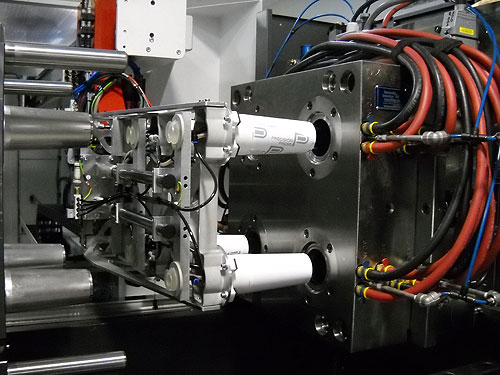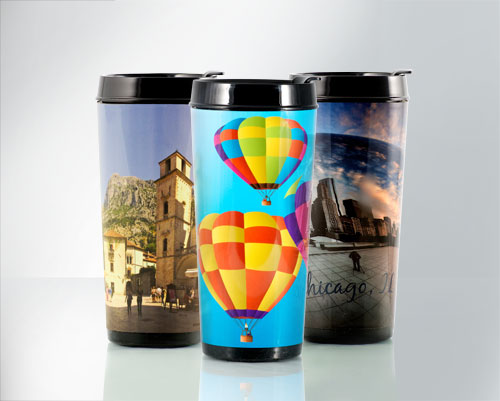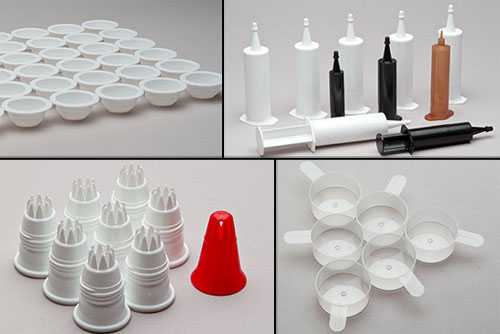IML an Award-Winning Growth Strategy for Magenta LLC
by Amy Bauer

The company currently is looking at ways to expand custom applications of in-mold labeling with new markets and new customers. To compete on a larger scale would require Magenta to build its own stock molds, tooling and work cells for that application.
Chicago-based Magenta LLC has positioned itself as an expert at developing custom packaging solutions, while also crafting a healthy line of stock products to serve its wide range of customers. Its biggest customer is lip care and personal care company Blistex, based in neighboring Oakbrook, IL. Other customers are scattered across the country and include popular household product and brand names such as Kraft foods, Nestle, Frito-Lay, Kikkoman, Zoetis, Pepsi (Gatorade) and many others.
Magenta serves companies in the food and beverage, personal care, household and car care, healthcare, medical/pharmaceutical and animal health markets. The company offers thin-wall molding, multi-material molding, insert molding and high-speed assembly. Decorating capabilities include in-mold labeling, pressure-sensitive label application, hot stamping and dry offset printing.
Products include everything from thin-walled containers and lids to thick-walled jars and dispensing closures, multi-component fitments and specialized parts. Among Magenta’s secondary operations are high-speed assembly, closure lining, hinge closing and sonic welding.
While many items are returned to customers for filling and packaging, Magenta also produces some items that it ultimately packages for consumers, such as the Nestle Nurser, a baby bottle with cap in which Magenta molds the pieces, inserts and seals them into a pouch. These bottles are given to new families in hospitals on behalf of Gerber. Such pouches also are used in some of Magenta’s pharmaceutical applications.
Located in a 120,000-square-foot facility in a residential area on the northwest side of Chicago, Magenta LLC has a workforce of approximately 140 employees. Most are full-time workers, and the company runs three shifts, five days a week, with weekend shifts as needed. During seasonal busy times, temporary workers are added as needed.
Focus on packaging helps Magenta evolve
Magenta LLC was founded in 1969 by entrepreneur John Song. Song described Magenta’s founding in his 2004 book "Eastern Wisdom Helps Enterprise: The True Story of a Successful Entrepreneur." Song started the business in a 5,000-square-foot garage with $50,000 capital. To build up its customer base, he sought subcontracting jobs with molders who had excess work.
Early on, the company did molding work for IBM, Lexmark printers and an array of other companies. Over time, Magenta evolved to focus more on packaging, though Dave Ziegenhorn, vice president of engineering and technology, said the company still manufactures two or three parts that go inside Lexmark printers.
According to Song’s book, Magenta’s relationship with IBM began in 1970 when the procurement supervisor of the Kentucky IBM plant came and toured Magenta’s facility. Two years later, he visited again and Song secured a contract with the company, which would become one of Magenta’s most important customers, making up about 30 percent of its business. In 1985, IBM brought its molding operations in-house, necessitating a shift for Magenta that led to greater diversification.
Song decided to boost Magenta’s sales force and look for a small company with proprietary plastic products that he could buy. He purchased the plastic closure business from a can company for which he had worked in research and development in the past. He then focused on expanding the markets for the closures, and the business evolved from there. In 2008, Song sold the company to SFH Company LLC, which owns a portfolio of companies in the plastic injection molding industry.
Today, closures are among Magenta LLC’s menu of six to eight stock items, including a 63mm shaker cap, such as those used for parmesan cheese or large spices; a 110mm dispensing lid for applications such as rock salt or plant food; Pouch Smart dispensing filaments for the squeezable pouches now popular for baby and toddler food and snacks; a 25cc dispensing scoop; a 28mm dispensing cap, such as those on dish soap; and a 38mm Smart Bottle fitting.
Magenta also produces plant tissue culture containers for schools, universities and science labs. These are polycarbonate vessels – which will stand up to autoclaving for sterilization – with a polypropylene closure and drip ring. Magenta also molds and assembles syringes, squeezable tubes and propel/repel packaging, such as lip balm tubes.
Stock products "provide an immediate remedy to a specific need without the wait or expense of a custom program," according to Magenta’s website, www.magentallc.com. These products can be produced in an array of different colors and allow Magenta to offer these items to any company in a speedy, cost-efficient manner. Magenta provides sample packs to companies interested in its stock products, so they can try the closures or other items on their production lines and with their products.
Custom production builds industry reputation
Stock items supplement Magenta’s custom work. More than 80 percent of Magenta’s business is custom production, Ziegenhorn said, and he attributes the company’s success in this regard to its diversified staff. "You have to have people in the right disciplines. We’re an injection molder, but you have to have people who understand all the auxiliary equipment," he said. "If you just want to injection mold, we’ve got people who do that. But if you want to label your package, we’ve got people who excel in labeling. We’ve got people who excel in in-mold labeling. We’ve got people who excel in other printing."
"So we’ve got a bunch of people here who have an open mind to doing something other than injection molding," he said. "If someone comes to us and says, ‘I want this part, and I want it assembled with another one,’ then we’ve got the people who can propose how we would do that – whether we build another machine or it’s hand-assembled or whatever. There are multiple ways of doing it – we’ve just got to find the best way."
While Ziegenhorn said employees aren’t formally cross-trained and generally operate within their own departments, they have the initiative to assess how something works and help out where needed.
Magenta’s design team works with companies to refine their concepts into a workable design, with 3D CAD drawings and customer input that ultimately results in a prototype mold. Production tools or molds from four to 64 cavities then are built and qualified to ensure they are within the dimensions and tolerances required by the customer.
Sustainability often is considered at this stage in the process, too, since different materials or design tweaks could result in less waste and more efficiency. Magenta also works with companies interested in light-weighting their packaging, figuring out ways to reduce the weight of the container or item without affecting performance or ergonomics. "It can be as simple as minimizing the wall thickness of a closure or as challenging as a total redesign," wrote Kevin Bajus, vice president of sales and marketing, in an article on sustainability on Magenta’s website. "Payback can be swift, with specific consideration given to resin usage savings, tooling modification costs and annual volumes."
IML cup captures interest
A newer product that blends the best of Magenta’s stock and custom capabilities with its in-mold prowess is what the company call its "hot cup." These travel-type beverage containers are double-wall insulated to keep hot drinks hot or cold drinks cold. The containers have a proprietary lid design with colored "flippers" to accent the graphics on the label.
Magenta is using its IML processes to produce the photo-quality reproductions and graphics. Ziegenhorn said a thicker label is used in the IML process for these cups because they are designed to withstand microwaving and repeated dishwashing. The company also produces some in-mold-labeled cups designed for single uses, and those incorporate a thinner label.
Offered since spring 2013, Magenta’s design has been a hit and the product won the 2013 In-Mold Decorating Association (IMDA) Gold Award for Best Injection Molded (IML) Package.
The cup has several selling points that Magenta’s sister company, SFH Elite Design, is highlighting in marketing it to customers. The cup is made of 75-percent post-consumer recycled polypropylene, and the polypropylene label can be recycled with the cup. SFH also is touting the cup’s "Made in the USA" credentials.
The hot cup evolved from another similar cup that Magenta molds and provides (though it isn’t in-mold labeled) to a nationwide coffee chain through a third party. Ziegenhorn said Magenta is targeting a wide range of potential new customers – including special events and retailers – with the cup, which can be customized with corporate logos, seasonal artwork, sports teams and more.
In-mold labeling offers advantages
Magenta began offering in-mold labeling within the past decade as a value-added option for its customers, and Ziegenhorn said it’s a small but growing portion of the company’s business. With the process being used on several of the company’s current projects, about 10 employees are dedicated to in-mold labeling across all of Magenta’s shifts, he said.
Bajus notes on Magenta’s website the many advantages that in-mold labeling offers customers, including enhanced point-of purchase differentiation, durability and lower overall cost. "When you consider placement, orientation, line speeds and graphics, decorating can consume up to 50 percent of a package’s overall costs," Bajus wrote. "As such, any misstep or enhancement during this process can significantly impact the finished packaging."
Ziegenhorn said the company currently is looking at ways to expand custom applications of in-mold labeling with new markets and new customers. To compete on a larger scale, he said, would require Magenta to build its own stock molds, tooling and work cells for that application. "We’re looking at it. It is a long-term strategy for us," he said.
Ziegenhorn said Magenta joined the In-Mold Decorating Association (IMDA) last year specifically to increase its knowledge and resources in this area. "What we like about in-mold decorating is that it’s something where you can quickly change a package for somebody just by changing the label," he said. "Now the customer doesn’t have to apply the label themselves. They get the product in, put it on their line and go."
The extra durability offered by in-mold labels and their seamless look on packaging are other key selling points, Ziegenhorn said, and Magenta’s willingness to try new things and to put in the effort to make new projects work sets the company apart. "We don’t have any preconceived ideas of how something should be done," he explained.
On the production floor
Magenta’s injection molding machines range from 50 tons to 550 tons of pressure, and capabilities include high-speed hydraulic/hydro-electric molding. The company strives to use energy-efficient electric presses where possible, and the smaller tonnage presses often are used for pilot and prototype projects. Auxiliary equipment offers the in-mold labeling capabilities, and these bolt-on additions are customized to each job. Magenta works with equipment from Swiss company Muller for its in-mold labeling operations and Engel equipment for its IML injection machines.
All of Magenta’s employees complete a series of trainings depending on their role in the company. Ziegenhorn said each new employee also is paired with a mentor for several weeks to assist in the training process. "If you’re a press operator, they show you how to watch the parts come out of the press, how to box them up and all the paperwork that should be filled out. That’s done for operators, for quality personnel and even for the shipping department," he explained. A morning meeting each day helps the production department to quickly address any challenges and to share information about the day’s goals.
Quality procedures – Magenta is ISO 9001 standard certified – are important in every department, and custom quality plans are created for each project. In-process inspection equipment, including vision and metal-detection systems, are used as needed.
Hiring and maintaining employees who value excellence is key, Ziegenhorn said. "You have to find the people who have that eye for quality and the manufacturing people who want to do the job right," he said. "You put your procedures together and put the right people in the right position to be successful."
Many of Magenta’s employees have been with the company since its original ownership – some as long as 30 years, he said. That longevity has served Magenta well for the past 44 years, and the company is looking ahead to a sustained future.
Ultimately, Ziegenhorn said, Magenta is focused on growth and expanding its business. Ideally that would involve adding additional injection molding machines – including replacing some of its older machines with newer, high-speed machines – adding more in-mold decorating and assembly capabilities and perhaps growing beyond the company’s current space.
The key, he noted, is connecting with the right customers. "We’re assessing what markets we want to go into," he said. "I would say our growth is going to be with new customers and new markets."


